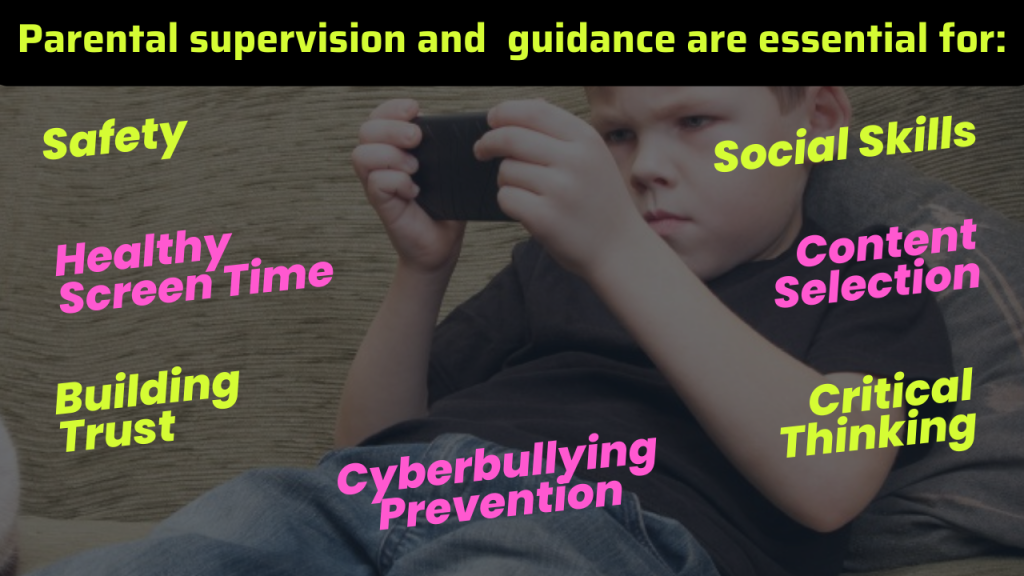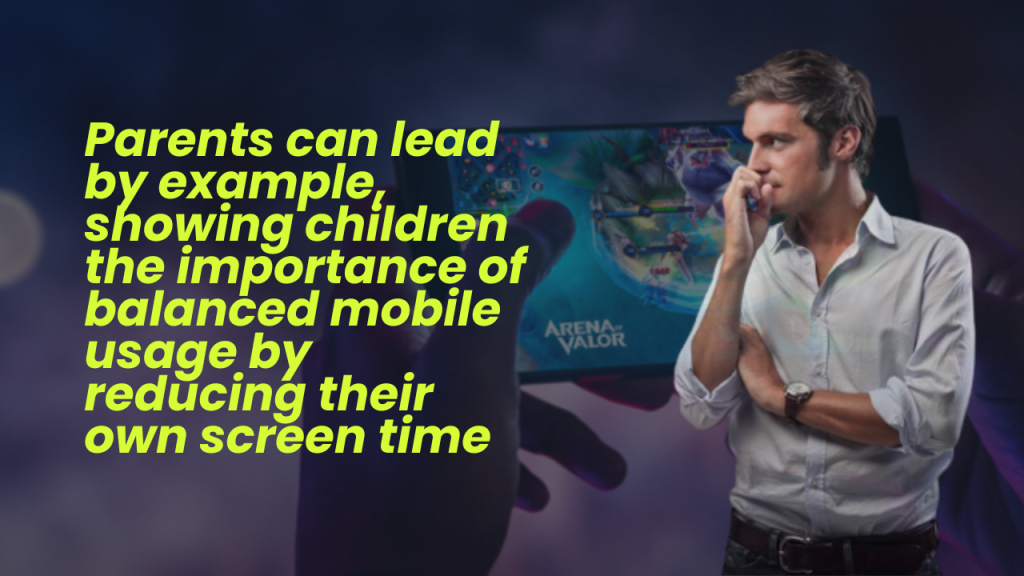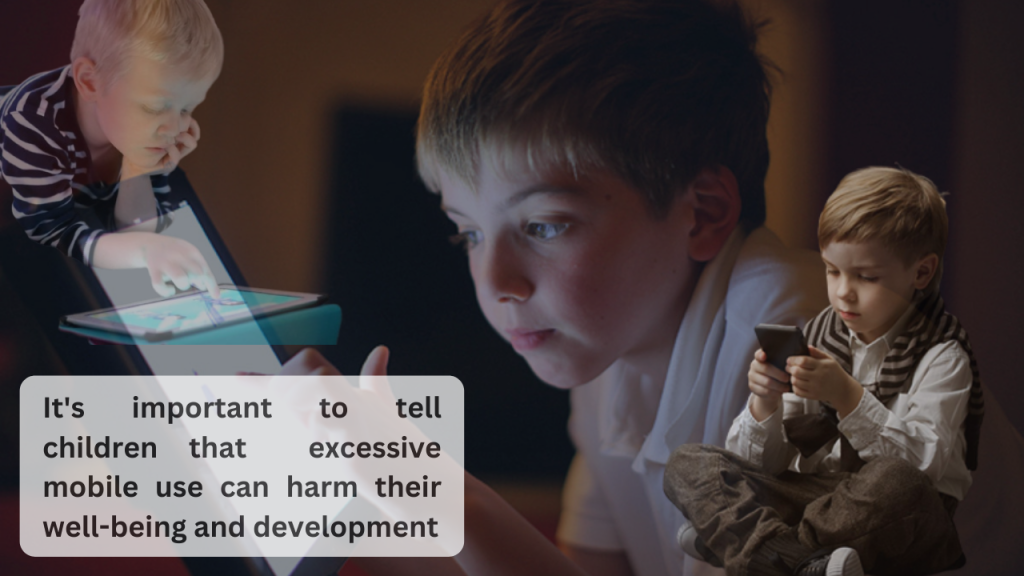In today’s digital age, mobile devices have become an integral part of our lives, offering convenience, entertainment, and access to a wealth of information. While these technological advancements have their merits, they also bring forth a growing concern – mobile addiction in children. This issue calls for vigilant parental supervision and guidance to ensure a balanced and healthy digital lifestyle for our youngsters.
The Rise of Mobile Addiction:
Mobile addiction, often referred to as “screen addiction” or “smartphone addiction,” is the excessive and compulsive use of mobile devices. This phenomenon has been on the rise, with children as young as toddlers becoming captivated by screens. With the allure of colorful apps, games, and videos, it’s no wonder that children are drawn to these devices.
Why Parental Supervision and Guidance Matter?

Understanding Content :
Parents hold a crucial responsibility in the digital age, which involves actively supervising and understanding the content their children access through mobile devices. Mobile devices offer a vast spectrum of content, ranging from educational apps that stimulate learning to potentially harmful material that can negatively impact a child’s development. To safeguard their children’s online experiences, parents must engage in vigilant supervision and ensure that the content aligns with age-appropriateness and constructive learning.
One of the primary reasons parents need to oversee content consumption is to protect their children from exposure to inappropriate or harmful material. The internet can be a treasure trove of valuable information, but it also harbors content that may not be suitable for young eyes. By keeping a watchful eye on their children’s digital activities, parents can act as a filter, allowing access only to content that is safe, educational, and age-appropriate. This proactive approach helps shield children from potentially traumatic or harmful experiences while ensuring they reap the benefits of technology in a controlled environment.
Furthermore, active content monitoring empowers parents to actively engage with their children’s interests and learning experiences. By understanding the content their children are exposed to, parents can spark meaningful conversations, offer guidance, and even participate in educational activities together. This not only strengthens the parent-child bond but also ensures that children receive valuable guidance on how to navigate the digital world responsibly. In essence, parents become digital mentors, steering their children towards content that fosters growth, creativity, and positive development.
Setting Screen Time Limits:
Setting time limits on screen usage is a fundamental aspect of responsible parenting in the digital age. Excessive screen time can result in a myriad of issues, ranging from sleep disturbances to diminished physical activity and even hindered social development in children. It’s imperative for parents to establish and enforce reasonable screen time boundaries to strike a harmonious balance between digital and real-world experiences.

One of the most pressing concerns linked to excessive screen time is its impact on sleep patterns. Staring at screens before bedtime can disrupt the body’s natural circadian rhythms due to the blue light emitted by devices. This disruption can make it difficult for children to fall asleep, resulting in poor sleep quality and daytime fatigue. By imposing screen time limits, parents can create a wind-down period that promotes better sleep hygiene and ensures their children get the rest they need to thrive.
In addition to sleep problems, excessive screen time often leads to reduced physical activity. When children spend prolonged hours on screens, they have less time for physical play and exercise. This sedentary lifestyle can contribute to health issues like obesity and diminished overall fitness. By setting reasonable screen time limits, parents encourage their children to engage in physical activities, fostering healthier bodies and habits.
Furthermore, an overreliance on screens can negatively impact a child’s social development. Face-to-face interactions are essential for building social skills, empathy, and emotional intelligence. When children spend too much time on screens, they miss out on opportunities to develop these crucial life skills. Setting screen time limits allows parents to ensure that their children engage in meaningful, real-world interactions, nurturing their social growth and emotional well-being.
In conclusion, setting screen time limits is a pivotal strategy in safeguarding children’s physical and mental health. By doing so, parents can mitigate the adverse effects of excessive screen time, promote better sleep, encourage physical activity, and foster healthy social development. In this way, they can empower their children to lead balanced lives in the digital age.
Promoting Healthy Habits:
Firstly, teaching children to take breaks during screen time is essential for their physical and mental well-being. Prolonged periods of device use can lead to eyestrain, fatigue, and decreased attention spans. Parents should encourage their children to pause and step away from screens at regular intervals. These breaks not only help alleviate physical discomfort but also promote healthier screen habits by encouraging children to engage in other activities, such as stretching, reading, or spending time outdoors.

Secondly, protecting children’s eyes while using digital devices is paramount. Parents can educate their children about the 20-20-20 rule, which suggests taking a 20-second break to look at something 20 feet away every 20 minutes of screen time. Additionally, they can ensure that screen brightness is adjusted to a comfortable level and that devices are used in well-lit areas. These practices safeguard eye health and instill a sense of responsibility in children when it comes to their digital interactions.
Lastly, maintaining good posture while using devices is crucial for preventing musculoskeletal issues. Parents can guide their children on how to sit or stand ergonomically while using devices, ensuring that screens are at eye level, and chairs provide adequate support. Teaching children about proper posture not only prevents discomfort but also establishes lifelong habits that contribute to their overall well-being.
In conclusion, teaching children responsible digital habits is an essential part of preparing them for the digital world. Parents can make a significant impact by emphasizing the importance of taking breaks, protecting their eyes, and maintaining good posture during screen time. These valuable lessons not only contribute to children’s immediate comfort but also lay the foundation for them to become responsible and mindful digital citizens as they grow.
Open Communication:

Creating an environment of open communication is a cornerstone of effective parenting in the digital age. Encouraging children to feel comfortable discussing their digital experiences, whether positive or negative, is paramount. This approach fosters trust between parents and children and enables parents to address any concerns or issues promptly and effectively.
Open communication begins with actively listening to children without judgment. Parents should make an effort to understand their children’s digital world and the challenges they may encounter online. By showing genuine interest and empathy, parents can create a safe space where children feel free to express their thoughts, questions, and concerns without fear of criticism or punishment. This open and non-judgmental attitude encourages children to open up about their online experiences, making it easier for parents to guide them in a supportive manner.
Moreover, open communication helps parents stay informed about their children’s digital activities. By engaging in regular conversations about what their children do online, parents gain insights into potential issues like cyberbullying, inappropriate content, or excessive screen time. This awareness enables parents to take proactive measures to protect their children’s well-being and ensure a positive online experience. When children know they can confide in their parents, they are more likely to seek help and guidance when they encounter challenges, ultimately fostering a stronger parent-child bond and a safer digital environment for young users.
Leading by Example:

Setting a positive example through our own behavior is one of the most powerful tools parents have in addressing mobile addiction in children. Children are keen observers, and they often mimic the actions of their parents. Therefore, if parents find themselves frequently glued to their screens, whether it’s for work or leisure, children are more likely to perceive excessive screen time as normal. To combat mobile addiction effectively, parents must take the lead by modeling healthy screen habits.
One key aspect of leading by example is establishing designated screen-free times and zones within the household. When parents prioritize face-to-face interactions and limit their own screen time during family meals or quality time together, children learn the importance of being present in the moment. This practice fosters a healthy digital balance and reinforces the idea that screens are tools for specific purposes rather than constant companions.
Additionally, parents can engage in joint activities that involve screens in a balanced manner. For instance, parents and children can enjoy educational apps, movies, or games together as a family, providing an opportunity to bond while also demonstrating responsible screen use. This collaborative approach reinforces the notion that screens can be enjoyable when used mindfully and in moderation, ultimately helping children develop a healthier relationship with technology. By consistently modeling these positive screen habits, parents lay the foundation for their children to become responsible digital citizens.
Educating About the Consequences:
Educating children about the consequences of excessive screen time is an essential step in helping them develop a sense of responsibility and mindfulness in their digital interactions. Parents can play a pivotal role by explaining the potential repercussions in an age-appropriate and empathetic manner. By doing so, children gain a deeper understanding of why it’s crucial to use their devices more mindfully.

One critical aspect to emphasize is the impact on physical health. Excessive screen time can lead to eye strain and discomfort, which children may not immediately recognize. By explaining how prolonged screen use can affect their eyes and overall well-being, parents help children become more aware of the importance of taking breaks and practicing good screen hygiene. Additionally, parents can discuss how excessive screen time can disrupt sleep patterns, leading to fatigue and reduced concentration, which can, in turn, affect school performance. Understanding these connections between screen time and their overall health and daily life can motivate children to make more informed choices.
Moreover, discussing the potential impact on relationships is crucial. Children may not always realize how excessive screen time can hinder their ability to engage with family and friends. Parents can highlight the importance of spending quality time with loved ones and maintaining face-to-face connections. By showing children how screen addiction can affect their social interactions and relationships, parents encourage them to strike a balance between screen time and real-world experiences. In essence, educating children about the consequences empowers them to make mindful choices regarding their device usage, ultimately fostering healthier digital habits.
In an era dominated by technology, parental supervision and guidance are essential tools in combating mobile addiction in children. By actively monitoring content, setting time limits, promoting healthy habits, fostering open communication, leading by example, and educating children about the consequences of excessive screen time, parents can equip their children with the skills and knowledge needed to navigate the digital world responsibly. Together, we can ensure that our children grow up to be well-rounded individuals who harness the benefits of technology without falling victim to its addictive allure.



Leave a Reply